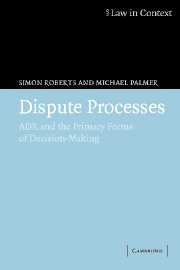Book contents
- Frontmatter
- Contents
- Preface
- Acknowledgements
- 1 Introduction
- 2 Cultures of Decision-making: Precursors to the Emergence of ADR
- 3 The Debates Around Civil Justice and the Movement Towards Procedural Innovation
- 4 Disputes and Dispute Processes
- 5 Negotiations
- 6 Mediation
- 7 Umpiring
- 8 Hybrid Forms and Processual Experimentation
- 9 The Trajectory of Alternative Dispute Resolution
- Bibliography
- Index
6 - Mediation
Published online by Cambridge University Press: 05 June 2012
- Frontmatter
- Contents
- Preface
- Acknowledgements
- 1 Introduction
- 2 Cultures of Decision-making: Precursors to the Emergence of ADR
- 3 The Debates Around Civil Justice and the Movement Towards Procedural Innovation
- 4 Disputes and Dispute Processes
- 5 Negotiations
- 6 Mediation
- 7 Umpiring
- 8 Hybrid Forms and Processual Experimentation
- 9 The Trajectory of Alternative Dispute Resolution
- Bibliography
- Index
Summary
Introduction – The Nature of Mediation
With the gradual re-institutionalisation of mediation in the West across the last years of the twentieth century, quite a strong stereotype seems in the process of emerging. This is one of the disinterested professional, deliberately attempting ‘to advance the interests of the disputants’ (Princen, 1992: 48) by taking responsibility for process, thus assisting embattled parties to reach decisions on the substance of the issues between them. But as we saw in Chapter Four the image of the professional mediator, self-consciously facilitating other people's decision-making on matters in which she or he has no direct stake, conveys only a partial sense of a very complex constellation of interventions, arguably universally visible in one form or another across the social world.
While the mediator receives quite limited attention in classical social theory, a defining analysis was provided early in the twentieth century by the German sociologist Georg Simmel. In some almost poetic passages of his great Soziologie (1908 [1950]), Simmel pointed to the fact that the mediator is always present in the social world even though she may not be named as such and her role may remain unexamined. The constellation yielding the mediator, he argued, is a structural feature, generally observable across cultures in all groups of more than two elements. Reflecting upon the nature of bilateral relations and upon the fundamental ways in which these are transformed by the presence of a third party, he noted: ‘dyads … have very specific features … the addition of a third person completely changes them’ (1908 [1950]: 138).
- Type
- Chapter
- Information
- Dispute ProcessesADR and the Primary Forms of Decision-Making, pp. 153 - 220Publisher: Cambridge University PressPrint publication year: 2005
- 1
- Cited by



